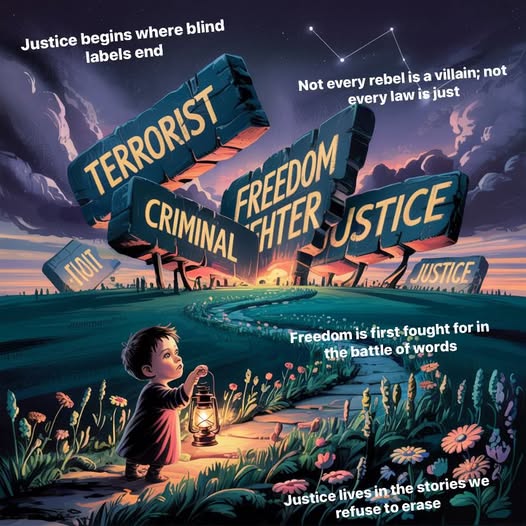
The little girl sat again by the fire, tucked into the same wooly blanket, her knees drawn up to her chest.
Her grandfather, with his silver hair and soft, knowing smile, rocked slowly in his chair, whittling a small piece of wood into a tiny bird.
“Grandpa,” she said, looking up from the flickering flames, “last time you said nature knows how to live free.
But… why do people sometimes call others bad names when they try to live free too?”
The old man set down his carving and leaned forward, his voice low and warm.
“Ah,” he said, “that is a deep question, little star.
Let me tell you a story Kavi once shared with me.”
“Long ago,” he began, “there was a village beside a great river, where people lived in peace, growing their food and singing their songs.
One day, strangers came.
They wanted the river, the land, the songs — everything.”
The little girl’s brow furrowed.
“But the villagers said, ‘This is our home.’
And they stood bravely by their river.”
The grandfather sighed, stroking his beard.
“The strangers didn’t like being told ‘no.’
So they gave the villagers ugly names.
They called them ‘dangerous people’, ‘rebels,’ ‘troublemakers,’ even ‘terrorists.’
He leaned closer.
“And once enough people repeated those names — even the villagers began to doubt themselves.”
“You see,” he said, “there’s a powerful trick in the world: if you control the words, you can control the story, you control how people see the world.
If you call someone a ‘criminal’ enough times, people will start to believe it — even if that person was only defending their home.
And soon, others believed those names — without ever listening to the villagers’ true story.”
The little girl’s eyes grew wide.
He paused, letting the fire crackle in the silence.
“Kavi said that when those in power want to hide injustice, they don’t just build walls — they build words.
They build words like prisons, so no one sees the truth behind them.”
The girl frowned. “But isn’t there a way to tell who’s really right?”
Her grandfather smiled warmly.
“Yes. Kavi taught us how.”
“Kavi taught that when those in power wish to steal, they don’t just bring soldiers — they bring words.
Words that twist the truth until right looks wrong, and wrong looks right.”
The little girl hugged her knees tighter.
“But how do we know who’s telling the truth?”
The old man’s smile deepened, his eyes crinkling like folded maps.
“Kavi gave us a way.”
“First,” he said, holding up one finger, “always ask: Who wrote the rules?
If someone powerful writes the rules and then calls others ‘criminals’ for disagreeing, something might be wrong.”
He raised a second finger.
“Second,” he continued, “you must look at the hearts of the people — not the labels.
Are they standing for fairness, for dignity, for life?
If they are, then no matter what names they are called, they are on the side of what is right.”
A third finger.
“And third, don’t let others’ labels decide what you believe.
Listen with your heart, not just your ears.”
“Kavi used to say,” the grandfather chuckled softly,
‘Words are the first battlefield. If the oppressor names the world, the oppressed must rename it to be free. The powerful name the world to own it;
the free-hearted must rename it to stay free.’
He reached over and tousled her hair.
“So whenever you hear big words thrown around — ‘enemy,’ ‘terrorist,’ ‘dangerous’ , ‘criminal’—
pause.
Ask yourself:
Who is speaking?
Who benefits from the name?
And always listen with both your mind and your heart.”
The little girl was quiet for a long time.
Then she whispered, “So… we should be careful whose words we believe?”
“That’s my clever girl,” he whispered.
“And remember: sometimes the truest heroes are the ones the powerful are most afraid to name kindly.”
The fire popped and sighed as if agreeing.
The grandfather picked up his carving again, the little bird slowly taking shape —
a tiny thing of freedom in the palm of his hand.
And in the quiet glow of the hearth, the little girl knew she had learned something important:
Words are not just sounds.
They are doors — and she would choose which ones to walk through carefully.

